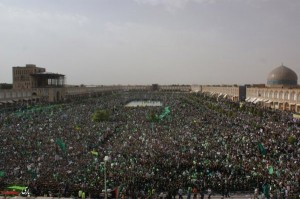The WSJ reported today on the surveillance infrastructure Iran has deployed over the last year and it explains why Iranians have been complaining about the speed of Internet access. It seems likely that the regime is monitoring (quite comprehensively) the activities of all Iranians. Since the internal network is controlled by the regime, it may be possible for them to identify protesters who are posting information online. This makes it extremely important that the protesters are successful in having the election re-run. If the current administration stays in place, they will most likely resort to a bloody purge, similar to ones in 1989 and 1999, killing another generation of reformist leaders. Ayatollah Montazeri’s fear that “People in the world are getting the idea that our business in Iran is just murdering people” will be realized in horrific fashion.
Meanwhile, the Guardian Council admitted that up to 3 million votes cast may be questionable, at the same time they claim this could not have affected the outcome (it’s 9% of the vote). It seems to me that the Guardian Council (all of whom are directly or indirectly appointed by Khamenei) are trying to reduce the appearance of lying through their teeth, but still trying to avoid another election. NYT’s The Lede blog has an analysis of the vote from a more disinterested organization.
Of course, the story of the day is a video of a young woman being shot in a melee. The videos are online, I’m not going to link to them, some news outlets are identifying her as Neda Soltan. A number of people as young as her have been killed, most likely by security forces using deadly force against largely peaceful protesters as a means of intimidation. Roger Cohen writes in today’s NYT about why these killings are a bad idea for the regime, given the importance of martyrdom in Shia history.

